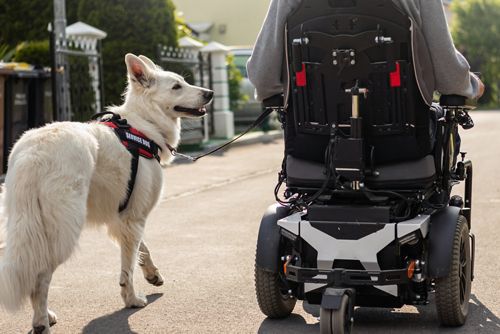St. Jude is committed to meeting the needs of people who require help from a service dog. If you or your child has a service dog, the Americans with Disabilities Act protects your rights.
At the same time, St. Jude must protect all patients from germs that can cause infection and from substances that can cause allergic reactions.
The Americans with Disabilities Act (ADA) defines a service dog as:
A dog that is individually trained to do work or perform tasks for the benefit of an individual with a disability, including a physical, sensory, psychiatric, intellectual, or mental disability.
The dog’s work or tasks must be directly related to a condition that the ADA considers a disability.
- Only dogs are considered service animals.
- A service dog is trained for a person with a disability. It has been trained only for that one person.
- A service dog is trained to do specific tasks for a person with a disability.
- A service dog cannot be just a general-purpose help dog.
- You or your child must need this help for a specific disability.
Should I call before bringing my service dog to St. Jude?
This is not needed, but it would be helpful. You can call 901-595-3300 and ask for the nursing house supervisor. This person evaluates service dogs that come to St. Jude. By calling ahead, you might help speed up the process.
If you are already in the hospital and are considering bringing a service dog, ask a staff member to call the nursing house supervisor.
What are my duties as a service dog handler?
- Under the ADA, you must supervise and control your service dog at all times. Service dogs must be leashed, harnessed, or crated. If these devices interfere with the service dog's work or the handler's disability makes it impossible to use them, the handler must keep control of the service dog through voice, signal, or other controls.
- Keep your service dog clean, healthy, and safe while at St. Jude and in St. Jude housing.
- Your service dog must be on medicine to prevent fleas, ticks, and heartworms.
- Your service dog must not have fever, stomach flu, fleas, ticks, skin sores, or parasites such as worms.
- Bathe and brush your service dog to make sure it is clean.
- Make sure your service dog does not affect the health, safety, or comfort of St. Jude patients, families, employees, or visitors.
- Your service dog must be housebroken.
- Carry dog waste bags at all times to clean up after your service dog.
- Your service dog may not bark a lot, disrupt patient care, or disturb people at the hospital or in housing.
- Do not allow other patients, families, employees, or visitors to pet or play with your service dog.
- Follow safety and hand washing guidelines to help protect St. Jude patients.
- Care for your service dog at all times. This includes:
- Walking
- Feeding
- Giving water
- Making sure your service dog relieves itself outside when it needs to
- Cleaning up accidents
St. Jude visitors or staff members are not allowed to watch, walk, feed, water, or clean up after your service dog
What happens if I cannot be with my service dog for some reason?
If you need a sitter or kennel, you must arrange for the service and pay for it.
How should I handle my service dog’s need to relieve itself?
Your service dog must relieve itself (urinate and pass feces) outside St. Jude buildings, along the fence around the edge of campus. You must pick up and, if needed, clean up after your service dog and put its waste in an outside trash can.
What if my service dog has an accident inside?
If your service dog accidentally relieves itself inside a St. Jude building, you must clean up the area. Ask Environmental Services staff for protective gloves and cleaner. The staff will explain where you can throw away the materials and waste.
Where can my service dog go at St. Jude?
Your service dog may be in any St. Jude area where the general public is allowed. This includes the Patient Care Center and dining areas. When you sit at a cafeteria table, the dog must be under the table.
If you want to take a service dog into an inpatient area or the intensive care unit (ICU), call your care team first for permission.
Where can my service dog not go?
- An empty patient room not assigned to you or your child
- Another patient’s room
- Areas where clean or sterile linens or supplies are stored
- Rooms used for surgery and other medical procedures, including rooms used before and after surgery
- Areas that are dangerous for the dog
If you must go to an area where your service dog is not allowed, St. Jude will provide another room for your service dog. If you cannot stay with your animal in these situations, you must contact a local sitter to stay with the dog.
When might staff ask my dog to leave an area?
A service dog will be removed from the St. Jude campus at the discretion of the St. Jude staff. They can remove the dog if:
- It displays any behaviors or noises that disrupt others.
- It poses a direct threat to the health or safety of others.
- It fails to remain under your control.
Questions
If you have questions about St. Jude Service Dog Guidelines, please ask to speak with a nursing house supervisor.



